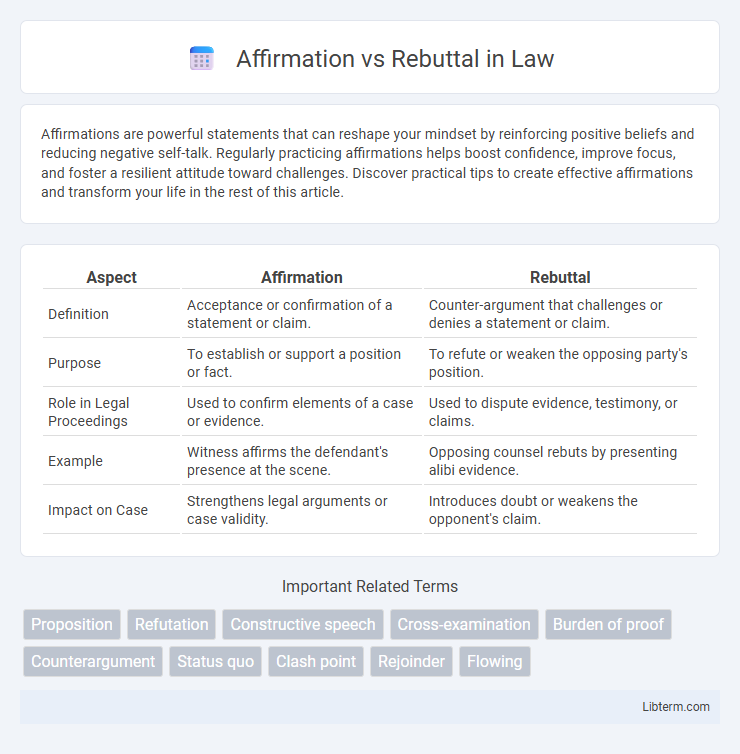Affirmations are powerful statements that can reshape your mindset by reinforcing positive beliefs and reducing negative self-talk. Regularly practicing affirmations helps boost confidence, improve focus, and foster a resilient attitude toward challenges. Discover practical tips to create effective affirmations and transform your life in the rest of this article.
Table of Comparison
| Aspect | Affirmation | Rebuttal |
|---|---|---|
| Definition | Acceptance or confirmation of a statement or claim. | Counter-argument that challenges or denies a statement or claim. |
| Purpose | To establish or support a position or fact. | To refute or weaken the opposing party's position. |
| Role in Legal Proceedings | Used to confirm elements of a case or evidence. | Used to dispute evidence, testimony, or claims. |
| Example | Witness affirms the defendant's presence at the scene. | Opposing counsel rebuts by presenting alibi evidence. |
| Impact on Case | Strengthens legal arguments or case validity. | Introduces doubt or weakens the opponent's claim. |
Understanding Affirmation: Definition and Purpose
Affirmation is the act of asserting a positive statement or agreeing with a thesis to support an argument or claim. Its purpose is to reinforce a point by providing evidence, reasoning, or validation that strengthens the overall position in a debate or discussion. Understanding affirmation helps clarify the foundation of agreement and substantiates the credibility of a presented viewpoint.
What is a Rebuttal? Key Concepts Explained
A rebuttal is a strategic response in a debate or argument designed to contradict or challenge an opponent's claim by presenting counter-evidence or reasoning. Key concepts include identifying logical fallacies, highlighting inconsistencies, and providing alternative viewpoints to weaken the opposition's position. Mastering the art of rebuttal involves critical thinking, effective communication, and a clear understanding of the original argument to create a compelling counter-argument.
Core Differences Between Affirmation and Rebuttal
Affirmation asserts the truth or validity of a statement, claim, or argument, establishing support or agreement with the presented idea. Rebuttal challenges or refutes the opposing argument by providing evidence or reasoning that disproves or undermines the original claim. The core difference lies in affirmation reinforcing a position, while rebuttal serves to contradict or negate it.
The Role of Affirmation in Argumentation
Affirmation in argumentation establishes agreement or support for a proposition, reinforcing the validity of claims with evidence and logical reasoning. It strengthens the position held by presenting consistent facts and reliable sources that align with the argument's core message. Affirmation serves to build credibility and persuade the audience by confirming truths rather than merely opposing counterarguments.
How Rebuttal Strengthens Critical Thinking
Rebuttal enhances critical thinking by requiring individuals to analyze opposing viewpoints and identify logical flaws, thereby fostering deeper understanding. Engaging in rebuttal encourages evidence-based reasoning and the evaluation of assumptions, which sharpens analytical skills. This process cultivates intellectual rigor, enabling more balanced and well-informed decisions.
Techniques for Crafting Effective Affirmations
Effective affirmations utilize clear, positive language that reinforces confidence and desired outcomes, often incorporating present tense and personal pronouns for stronger impact. Techniques include visualizing success and repeating affirmations consistently to reprogram subconscious beliefs and enhance motivation. Emphasizing specificity and emotional engagement in phrasing boosts affirmation effectiveness, making intentions more tangible and influential.
Strategies for Building Persuasive Rebuttals
Effective strategies for building persuasive rebuttals emphasize understanding the opponent's argument thoroughly and identifying logical fallacies or weak evidence. Utilizing clear, concise language to present counter-evidence and alternative perspectives strengthens the rebuttal's impact. Integrating credible sources and maintaining a respectful tone enhances credibility and persuasive power in debates.
Importance of Balance: Affirmation vs. Rebuttal in Debates
Effective debates rely on a strategic balance between affirmation and rebuttal to strengthen arguments and address opposing viewpoints. Affirmation builds credibility by supporting key claims with evidence, while rebuttal challenges counterarguments, preventing dominance of either side and promoting logical rigor. Mastering both techniques enhances persuasive communication and fosters deeper understanding in competitive discourse.
Common Mistakes in Using Affirmation and Rebuttal
Common mistakes in using affirmation include providing vague support that lacks specific evidence or failing to reinforce key points clearly, which weakens the argument's impact. In rebuttal, errors often involve misunderstanding the opponent's position or attacking irrelevant aspects, leading to ineffective counterarguments. Both require precise, well-structured responses to strengthen the overall debate performance.
Real-World Examples: Affirmation and Rebuttal in Action
Affirmation in real-world contexts often appears in courtroom settings where a lawyer supports a witness's credibility, reinforcing key facts to strengthen their case. Rebuttal involves presenting counter-evidence or arguments, such as when a defense attorney challenges the prosecution's claim by introducing an alibi or contradictory testimony. In political debates, affirmation is used by candidates to endorse policy proposals positively, while rebuttal dismantles opponents' arguments by highlighting inconsistencies or flaws.
Affirmation Infographic

 libterm.com
libterm.com